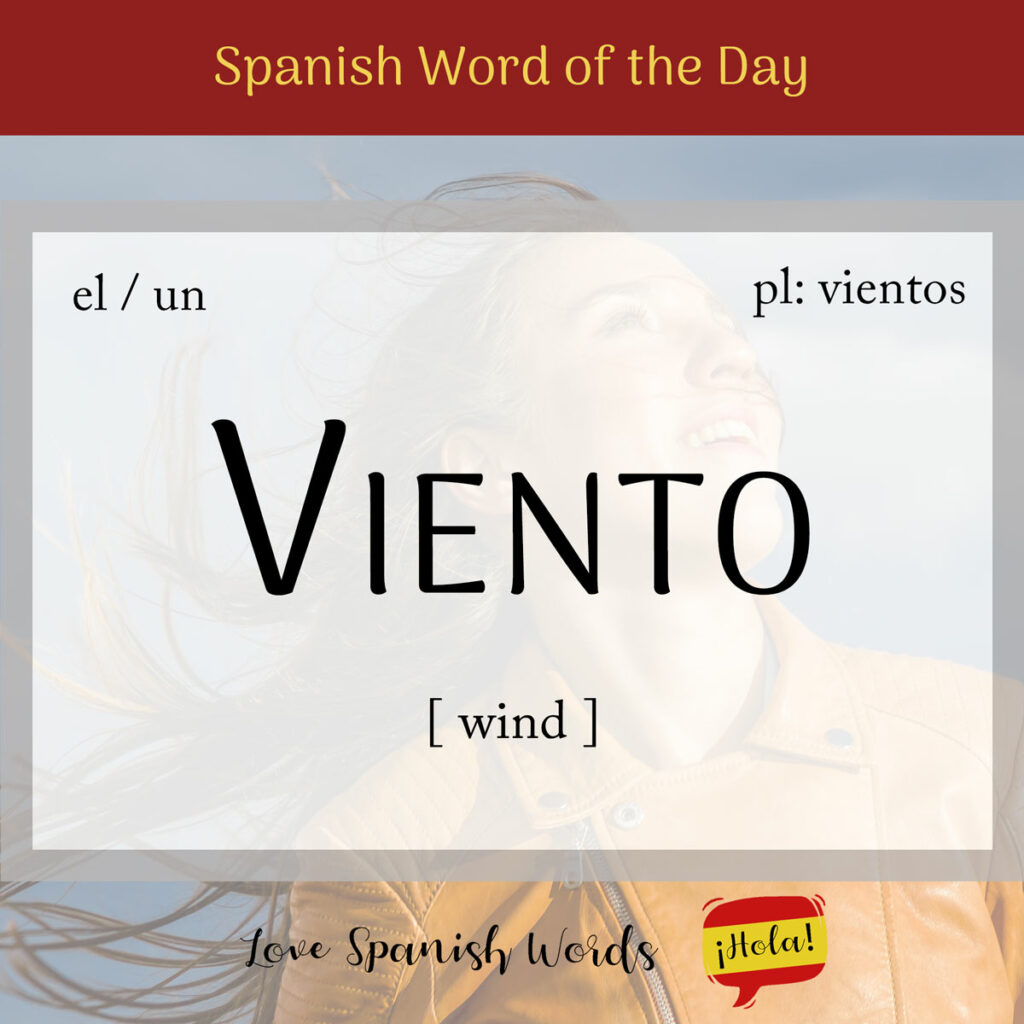One of the effects of climate change across the world is said to be that generally the weather will become more windy and the winds will be stronger. The Spanish word for wind is viento from the Latin ventus with the same meaning.
Latin American Pronunciation
European Pronunciation

Viento is a masculine noun and takes the following definite and indefinite articles:
- el viento = the wind
- los vientos = the winds
- un viento = a wind
- unos vientos = some winds
The word viento is actually used in many different contexts but let’s first of all deal with the most common use which of course has to do with the weather.
In simple terms, wind (el viento) is the movement of air (aire). This movement is caused by pressure differences, which in turn were caused by temperature differences.
If you are talking about the weather and you want to say that it is very windy, there are a few different ways to say this:
- corre mucho viento = using correr – to run
- hay mucho viento = using haber – to be
- hace mucho viento = using hacer – to do/to make
- sopla mucho viento = using soplar – to blow
Ten cuidado que hace mucho viento hoy.
Be careful, it is very windy today.
Some common phrases and objects using the word viento, some of which relate to the weather and some of which don’t:
- manga de viento = tornado/whirlwind
- vientos de cambio = winds of change
- torre de viento = pipe dream
- viento en popa = tailwind
- viento de proa = headwind
- viento helado = icy wind
- molino de viento = windmill
- escopeta de viento = air gun
- colchón de viento = air mattress
- instrumento de viento = wind instrument
The list could really go on and on describing all the different types of winds we have. Maybe you can find some more?


Synonym – commonly you will also hear the wind or viento described as el aire (the air).
¡Como corre el aire hoy! – It’s very windy today!
The last on that list was instrumento de viento, the wind instrument, and using the plural los vientos or la sección de viento we can talk about the wind section of an orchestra. These can be classified as viento metal (brass) and viento madera (woodwind).
Examples of these include: tuba (tuba), trompa o corno (French horn), trompeta (trumpet), trombón (trombone), fagot (bassoon), flauta (flute), saxofón (saxophone), oboe (oboe) and clarinete (clarinet).
Another interesting and very different meaning of the word viento is the guy rope used to secure a tent when camping.
Los vientos permiten sujetar bien la tienda de campaña.
The guy ropes allow the tent to be well secured.
When talking about the scent of an animal being tracked during hunting (de caza) the word viento is used.
Did you know that…?
The humorous word for flatulence is also viento!
Idiomatic expressions using ‘viento’:
As you can imagine there are a great many idiomatic expressions using the word viento. A few are listed below:
Gritar algo a los cuatro vientos
Literal translation: to shout something to the four winds
English meaning: shout from the rooftops (to express something so that the whole world can hear)
Como el viento
Literal translation: like the wind
English meaning: to do something very quickly
Marchar viento en popa
Literal translation: to walk with a tailwind
English meaning: when something is going really well
Beber los vientos de alguien
Literal translation: to drink somebody’s winds
English meaning: to be crazy about somebody
Luchar contra molinos de viento
Literal translation: to fight against windmills
English meaning: to fight against imaginary enemies or issues
Finally there are a couple more different meanings for the word viento to deal with before we finish: viento de perro is the keen sense of smell of a dog, and it can also be used to describe vanity (vanidad) or conceit.
Synonyms for viento:
There are numerous synonyms used for el viento when talking about the wind, these include: brisa, ventisca, galerna, huracán, corriente, ciclón, tornado, tifón, céfiro, and ventarrón.

